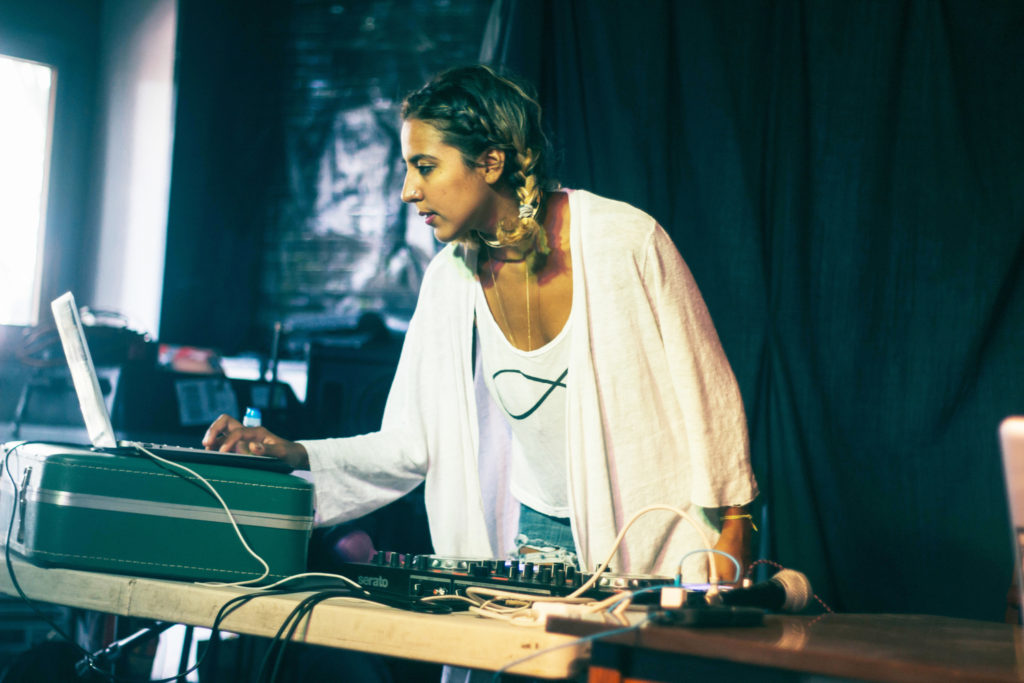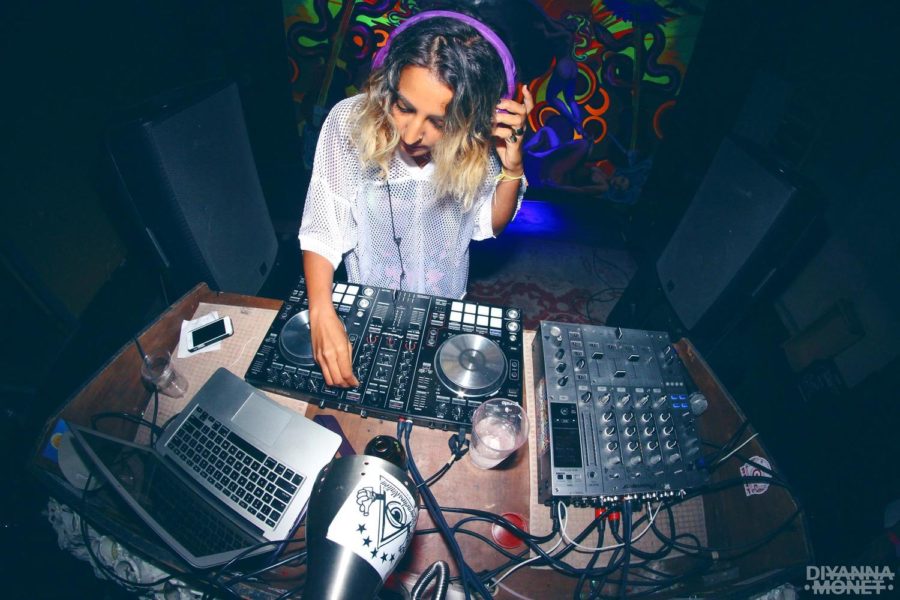After working for a nonprofit in D.C., Ayesha Chugh left her desk job to hit the decks, finding her place on the stage, mixing rhythms from hip-hop, R&B and other beat-heavy genres. But she didn’t plan it that way.
She came to D.C. as a student and finished a master’s at Georgetown in 2012, but she embraced DJing a couple of years ago and eventually gave up her policy-oriented career. Now she’s DJ Ayes Cold, pronounced “ice cold.” And in committing full-time to her craft, she’s become a fixture at U Street venues like the Velvet Lounge, Tropicalia and 9:30 club.
“When I started DJing and people started responding to it, I realized that, for the first time in my life, it was crystal clear to me that I enjoyed something,” the 29-year-old says, smiling. “I feel like we go through our lives in this haze — we’re not sure if the things we enjoy come from a place of genuine passion or not. In the past I’ve found it hard to separate the things I genuinely enjoy from the things I think I should enjoy.”
The Chicago-born, India-raised musician has also played at prominent local festivals — Broccoli City and Trillectro — and opened for fellow DJ/producer TOKiMONSTA. She’s staying busy in the near future too, with a performance at U Street’s Dodge City, a youth event at the Hirshhorn Museum and a slot during a benefit show at St. Stephen’s Church.
We met up to discuss the tensions inherent in deciding to become a full-time DJ, the emotional aspects of her field and why people shouldn’t compare her to a certain South Asian artist.
This interview has been edited for brevity and clarity.
Bandwidth: What pushed you to make the jump to being a full-time DJ?
DJ Ayes Cold: My earliest gigs were house parties and little art openings, for friends. Before that, I released a few mixes on Soundcloud and I realized that mixing came very intuitively to me. And I also realized that I really enjoyed it. I could just go down a rabbit hole and just test out blends and mixes for hours and hours and hours kind of like a child playing a videogame — that level of intensity and focus. When I started going out there and doing house parties and stuff, I felt like people’s enthusiasm and reception of me DJing matched the intensity and passion from which I came at it. So as soon as I saw that those two things actually aligned, like people’s enthusiasm with my own passion, that’s when I realized that there was an opportunity here and an opportunity I had to seize.
“My parents came from this background of very educated, intellectually aspiring, middle-class Indians, so you can imagine the things they were listening to.”
And was there anyone trying to hold you back from making that jump?
Everybody was encouraging, but I guess the pragmatist in me, at the time, was definitely a little conflicted and I had to fight that voice, which was like “Oh, you’ve worked so hard to go down this policy-oriented path, and you’re just going to leave it so you can move into a completely different direction of work?”
So most of that doubt was coming from yourself rather than other people?
Absolutely. That’s my biggest challenge, I think, is my own self-doubt. I have this ability to put on this confident exterior but I think a lot of artists struggle with crippling self-doubt. I feel like I’m also very sensitive, and I think that’s what makes people dance, to be honest. It’s because I’m very much about reading the energy from a crowd and that helps me when I get it right, but that makes it also hard to have a thick skin when you care about people. I guess I’m a hyper-empathetic person, or a hyper-empath. [Chugh references Octavia Butler’s novel Parable of the Sower, where the protagonist has “hyperempathy.”] I’m not literally her, but I do feel like I identify with her. I feel like the part of me that I used to want to work [on] before I started DJing, which was that super-sensitive part of me, I feel like now it’s a source of strength. Of course, a source of weakness too, but now a source of strength which is being able to connect with people and take them on a journey.

DJ Ayes Cold (Photo by Africanist)
How did you get into music? It seems, as a DJ, you have to know a lot about music.
To be honest, there’s still a lot of music that I’m still learning about. The more I DJ, the more I learn about music. The more spaces I go in, the more people come up and ask me for things I don’t have. I’m learning from people, I’m often getting a lot of tips from people in the crowd. Funk, hip-hop, early R&B — I’m still catching up to [them] because I spent my childhood outside of the U.S. It’s just classic, there’s nothing like it: the sound of ’90s R&B. I play it, but I didn’t grow up to a lot of ’90s R&B, I grew up to classic rock that my parents were listening to. Some DJs come from the angle that they [want to share their musical catalogs]. I don’t think I come from that angle. I’m going to be real with you, it’s not something that motivated me to DJ. I grew up listening to Eric Clapton, The Doors, INXS, Guns N Roses, Prince. If there was any R&B my parents had, it would be Seal, Sade, Whitney Houston — but Bodyguard era. Classic rock — in India it had a huge following. And then there was random Indian music, qawwali, folk music, Indian music they thought was “tasteful.” My parents came from this background of very educated, intellectually aspiring, middle-class Indians, so you can imagine the things they were listening to. Like Abida Parveen. If there were any Bollywood soundtracks, it would be to the film Bombay, I remember that from my childhood. And some Punjabi music, because my mom’s a Sikh, like Bally Sagoo, early bhangra, pop stuff. It was an interesting mix.
“People are very narrow-minded about brown women in music.”
Are you interested in incorporating more South Asian musical influences into your music?
I’m actually working on a track that has this bhangra influence but, I just — I don’t feel the urge to make South Asian-inspired music. I grew up playing the piano and I taught myself the guitar so I don’t really have an intimate understanding of Desi music. I don’t want to claim that. Why should I do it just because I’m brown? Although, this one track I’m working on, I took a mix that has a lot of old Bollywood music on it and I [sampled] some of the best parts. This is Bollywood music from the ’40s, ’50s, maybe ’60s, and there’s certain sitar riffs but I distort them. That’s a narrative that’s out there — the expectation or hope that I would make South Asian inspired beats. People hope that I can conform to it because I’m a South Asian woman and M.I.A. set [a precedent] for that.
But your sound is really different from M.I.A.
That’s true. But people are very narrow-minded about brown women in music. You don’t know how many times people have compared me to M.I.A., which is so ridiculous because we’re just so different. They just think “brown woman doing music with dye in her hair.” People are so quick to make comparisons to M.I.A. when you’re a brown woman doing something!
Any future projects in the works?
I have a series called The Freezer and there’s definitely a Vol. 6 coming out. I take forever to put them together so hoping I get my act together and release Vol. 6 early in the fall, but probably October or November. And I’m working on a lot of beats, and a lot of them are sitting on my hard drive but I know I want to release at least three of them by the late fall. I have enough material that I think I can do that, but the past six to eight months have been an intense process for me where I’ve been learning about music production, testing out different things, making beats, fine-tuning them; there’s so much that I constantly learn that’s new everyday and so I feel like by the fall, early winter, I’ll have reached a point where I’ll put something out. Probably a three-track EP, just a demo, just to test the waters.
What do you find roots you?
I have a hard time answering that right now. Rootlessness is something that I’m dealing with and that I’ve dealt with since I was a child. What roots me are values. What roots me is my approach to what I do. And that my approach is shaped by values and those values are hard work, not thinking about all the other distracting stuff, doing what I do from — it’s going to sound corny — a perspective of love and keeping that pure. Doing what I do from the perspective of really loving your craft and focusing on the craft. That’s what roots me. Everyone coming at me, asking me about my influences and where I’m going, not to say those questions shouldn’t be asked because that’s what helps make sense of artists, but I don’t really have good answers to those questions. I just really love playing with sounds. All kinds of music. I love every kind of music under the sun — except for really annoying EDM! But it’s my love of music that really is the grounding thing. I don’t know what the end game is from DJing, the future is uncertain, and you can see it as dark times and sometimes I feel that gravity, but the thing that brings me back down to focusing is the feeling I get when I DJ. It’s the pure feeling of joy; that’s what grounds me.
DJ Ayes Cold plays at U Street’s Dodge City on Aug. 28, a youth event at the Hirshhorn Sculpture Garden on Aug. 29, and a benefit St. Stephen’s Church on Sept. 1.


